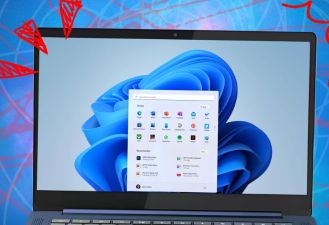Microsoft often refers to Windows 11 as the "latest and greatest" operating system. Over the years, it has become a cliché for Microsoft to use this adjective to praise the latest version. Although I usually have a positive attitude towards Windows, it is difficult to ignore the fact that the Windows experience seems to get worse after each update. It is really annoying that Microsoft can't help but put something annoying in the mouths of users for months.
Not to mention that Windows seems to have obvious quality control failures frequently. So many terrible updates frequently cause major problems such as blue screens, freezes, and data loss that it makes people feel that Microsoft doesn't care how much trouble this brings to users - no matter how bad the experience is, everyone still can't do without Windows, so Microsoft has become frank and rotten.
Microsoft often refers to Windows 11 as the "latest and greatest" operating system. Over the years, it has become a cliché for Microsoft to use this adjective to praise the latest version. Although I usually have a positive attitude towards Windows, it is difficult to ignore the fact that the Windows experience seems to get worse after each update. It is really annoying that Microsoft can't help but put something annoying in the mouths of users for months.
Not to mention that Windows seems to have obvious quality control failures frequently. So many terrible updates frequently cause major problems such as blue screens, freezes, and data loss that it makes people feel that Microsoft doesn't care how much trouble this brings to users - no matter how bad the experience is, everyone still can't do without Windows, so Microsoft has become frank and rotten.
Constant interference with user freedom
In early 2015, when Microsoft released Windows 10, CEO Satya Nadella said: "We want people to go from needing Windows, to choosing Windows, to loving Windows." Unfortunately, Microsoft seems to have lost this philosophy now, and the company is increasingly relying on the fact that many people just need Windows, whether because they are familiar with Windows or because the applications they use can only run on Windows.
Microsoft takes user choice for granted. Windows 8 first introduced the ability to log in with a Microsoft account, and starting with Windows 10, the feature became mandatory for Home users. Of course, there was only a simple solution at the time - just disconnect from the network to bypass the Microsoft account login. But starting with Windows 11, Microsoft is no longer so "tolerant" - it began to completely block all possible ways for users to bypass Microsoft accounts and network connections when installing the system. Now, Windows 11 Pro requires users to log in to a Microsoft account, and Microsoft has been working harder and harder to crack down on workarounds such as disconnecting from the Internet. Every major update seems to be trying to remove a user's escape plan.
But Windows is different. It didn't require logging in to an online account until recent years, and the vast majority of Windows users still just download applications through the Internet rather than the official Microsoft store. For most users, there are almost no immediately visible practical benefits to using a Microsoft account. Therefore, it is completely understandable that people would rather not use an account when possible.
Constantly forcing redundant features
If Microsoft can launch new features in Windows 11 that truly improve work efficiency, most users will be happy to see it. However, most of today's system changes are not like this - they are more about forcing the new vision conceived by Microsoft, even if users are not interested.
In 2023, Copilot was officially released. There was a new Copilot button on the taskbar, a sidebar dedicated to Copilot, which can be used to change some Windows settings, and a new keyboard shortcut. It should be noted that these features were not popular at the time, and it was launched unilaterally and continuously updated in an undeveloped state. Copilot is still promoted in various ways to this day. Although the sidebar is gone, the Copilot app still runs in the Windows system, and Microsoft even makes it run natively on the platform instead of as a web app, and is also developing features such as Copilot Vision. Meanwhile, video editors like Clipchamp are still web-based, and there is no sign that this will change in the short term, even if native apps can greatly improve its performance and experience.
2024 is the first year of Copilot+, which has become an excuse for Microsoft to pile on all kinds of redundant features. Computers can now automatically restyle photos, change backgrounds, and even use AI to make it look like you're looking straight into the camera when you look away. You can use AI to improve the quality of pictures in Paint, or use the Recall feature to go back in time . All of this, do users really need it? And Windows tablets used to have a simple gesture to open the notification panel, but now Microsoft has changed this gesture to launch "Recall" by default.
This hard-selling of unwelcome features seems to have permeated every corner of the Windows system. OneDrive is becoming more and more integrated with the operating system, and the backup function is enabled by default, without user consent during initial setup. This is a good feature, but unfortunately OneDrive only provides 5GB of free storage space, and it is easy to use up this quota with automatic backup, which feels like a routine to promote Microsoft 365 subscriptions. Copilot and AI features have also "invaded" the Notepad app, taking away its once simple and fast way of taking notes. In short, everything Microsoft does is to make you use something you don't need.
Constantly problematic updates and patches
To make matters worse, many Windows updates have problems with stability. Almost every time a new Windows patch is released, there are follow-up reports that it has caused problems for users and only made the system more inconvenient to use. To briefly review recent history, the April update caused problems with Windows Hello and some computers experienced a blue screen of death (BSOD) after the update. The May update caused some computers to not boot.



